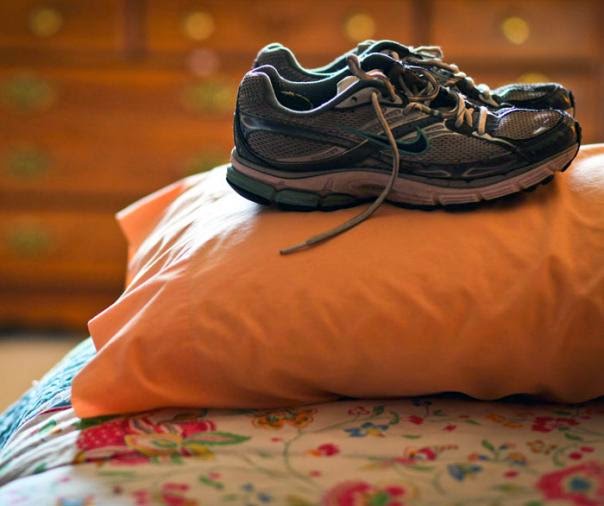But sometimes the time you'd like to commit toward daily exercise gets filled up with work or family obligations.
The next thing you know, it's dark out. And then it's dinner time, and then suddenly you just have one hour before you normally go to bed.
So you go to the gym or the home-based treadmill or hit the sidewalks in the dark with a bicycle flasher fixed to your back and a headlamp so you can rack up some mileage walking or running.
You come back, take a hot shower (it was cold outside!) and then try to go to sleep.
And try. And try. And you just can't.
That's because you just got your daily workout in at bedtime. Moderate exercise right before bed does a few things that make it harder for you to fall asleep.
- It raises your core temperature. Your body starts to cool off for the evening as the sun goes down in preparation for sleep. It's part of your body's overall circadian rhythms to do so. Exercising raises your body's temperature; right before bedtime, it takes that much longer for it to fall back to sleep-inducing levels.
- Add in that hot shower and you're in for a double whammy. While a warm shower is quite conducive to preparing the body for sleep, hot showers also raise the core body temperature, with disastrous results at bedtime.
- Your body kicks out major stress hormones (adrenaline, cortisol, norepinephrine) after a period of moderate exercise. These hormones encourage wakefulness, increase your pulse and breathing rates, speed up metabolism and arouse the liver and muscles to manage the changes in insulin and glucose that exercise brings. You may feel spent after a good workout, but your body is still in recovery mode and will take some time (half an hour or more) to process that additional burst of energy caused by your late-night jog or spin.
- Exercising at unexpected times can disrupt the circadian system, confusing it into thinking it should prepare to stay awake longer.
What should you do if you run out of time during the day but still need to get in some form of exercise?
Try a mild form of yoga (but avoid so-called "hot" yoga). Yoga stretches the limbs, promotes healthy breathing and relaxes the body. It encourages strength-building without raising the heart and respiratory rates to levels that trigger a stress response. It's also a great way to calm the mind before bed.
Practice yoga in a cool room with dim lights, if at all possible, and avoid treating yoga like an aerobic form of exercise (which it's not meant to be, anyway). Yoga is meant to undo the damage of bodily stress caused by poor posture, too much sitting or strain from heavy exercise or other physical activity. Treat it as the unwinding practice it is meant to be and leave the major physical activity for the daytime.
Reset your workout regimen for the early morning instead. Brisk exercise in the morning, ideally while outside as the sun is rising, is probably the best way to not only get in your daily workout, but to also reset your circadian rhythms, especially during the winter. The combination of exercise and exposure to light, especially sunlight, will help you achieve healthy sleep onset at bedtime after a long, energized day.



